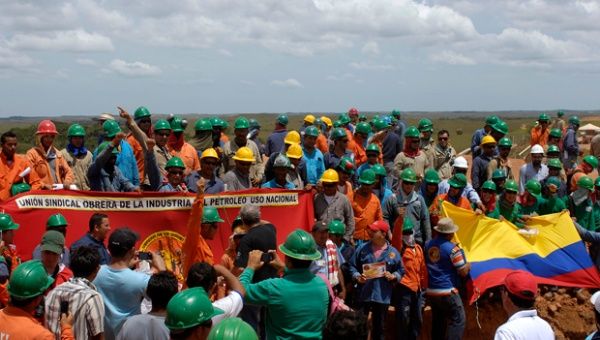As Colombia marks the International Day of the Disappeared, another unionist has been killed.
Oil sector workers on a strike in Oct. 2011
 Union leader Edith Santos, from the oil sector, was shot dead on Fridayabout 130 kilometers from the capital Bogota, said official sources on Friday.
Union leader Edith Santos, from the oil sector, was shot dead on Fridayabout 130 kilometers from the capital Bogota, said official sources on Friday.
Two men on a motorbike allegedly shot her twice in the chest while she was working in her office in San Isidro de Chichimene, in the municipality of Acacias, Meta state. She died from her injuries later in hospital.
The Workers' Union for the Petroleum Industry (USO) said this latest murder was in addition to the murder of Marco Suarez, General Secretary of the Central Union of Colombian Workers (CUT) in Meta, and that the murder has happened as the country marks the National Day of the Disappeared on Saturday .
The Ministry of Work requested an investigation into the murder.
Edith Santos was the president of a community association (CEJAID), as well as a leader of the National Union of Security Professionals (Sinproseg). She had been helping the communities of Meta to obtain an agreement over the hiring process of farmers in oil companies, according to official sources.
In December 2013, Juan Manuel Santos' government (National Unity, conservative) changed the hiring process, denying the right of community associations to mediate, regardless of their historical role in the areas where the oil industry was influential, such as in Meta- which has seem a recent boom in this sector.
In February, various local communities in Meta had protested against the executive order, and against new projects by the company Ecopetrol.
According to a 2012 report by the United Nations Development Program (UNDP), more than 2,800 union leaders and workers have been assassinated between 1984 (when data became available) and 2011 in Colombia, added to 216 forced disappearances, and 163 kidnappings, making Colombia one of the countries with the highest rate of this kind of homicide.
Carlos Miguel Ortiz, the coordinator of the project, then explained that “there [has been] a decrease since 2003, but we are still concerned because no years have a rate of under 30 homicides [of union leaders].” The report revealed that in 223 cases that led to a court trial, only 25 percent found an author of the crime. Their study showed that 14 percent of authors belonged to the paramilitary forces, 5.1 percent to guerrilla groups, and 1.7 percent to the state.